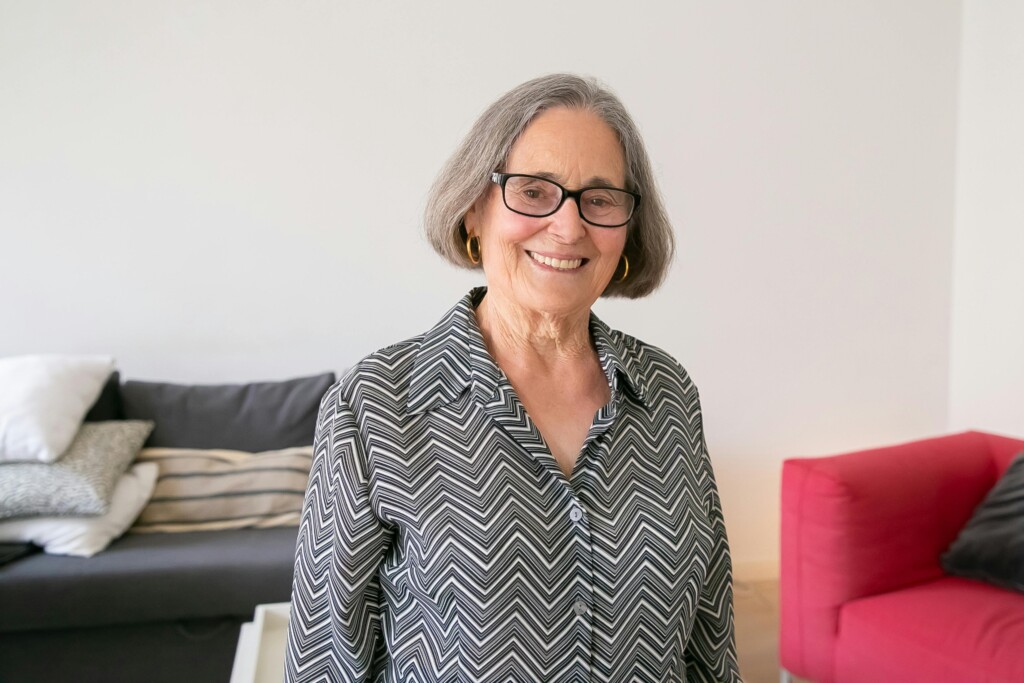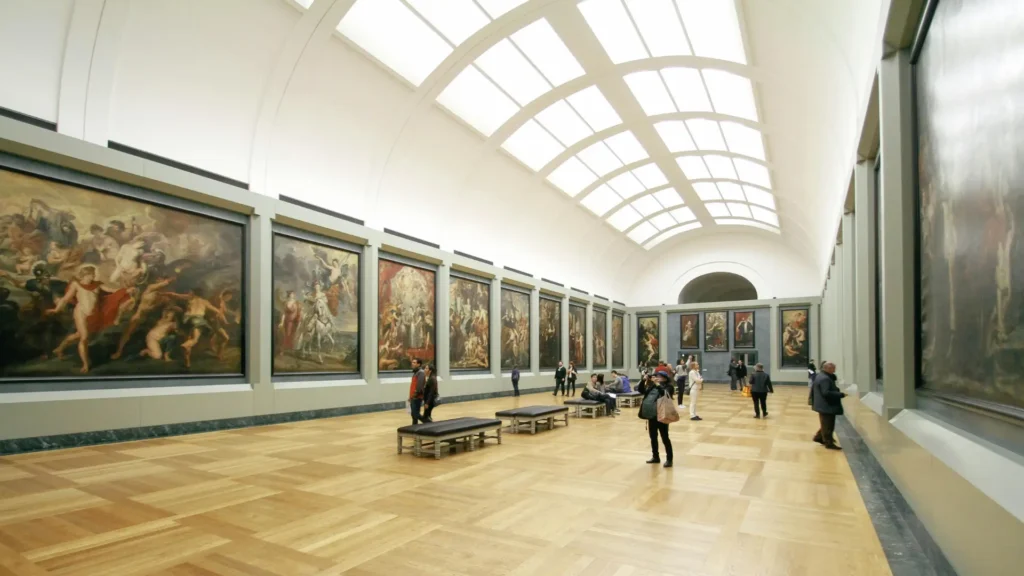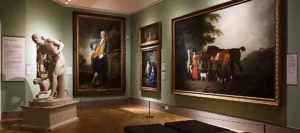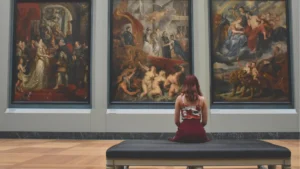Course Overview
Explore how art captures history, expresses identity, and challenges ideas through our A level History of Art course.
A level History of Art is a rich and inspiring subject that explores visual culture across time, place, and perspective.
This course stands out at A level for its focus on how art reflects society, power, religion, and identity. Students study key artists, movements, and masterpieces—from classical sculpture and Renaissance painting to modern and contemporary works—developing the skills to analyse and interpret visual meaning and context.
This A level course builds deep cultural awareness alongside critical thinking, visual analysis, and research skills. With flexible online learning, A level History of Art is a perfect foundation for further study or careers in arts, curation, education, design, or cultural heritage.
-
100% pass rate at Grades A* to C in 2025
-
Interactive course
-
Dedicated tutor support
A level History of Art at a glance
Edexcel 9HT0
Learn at your own pace
Approx. 250-300 hours* plus time for completing assignments
- The Shock of the New – students will receive 20% off voucher code upon enrolment to be used on the publisher’s website.
Internet access
Computer operating system and browser to support learn@nec.
11 assignments (one introductory) – these do not contribute towards your final grade
Set textbooks – included as a free ebook with your course:
- Thinking about Art: a thematic Guide to Art History, by Penny Huntsman, Wiley-Blackwell, ISBN: 978-1-11890-497
Earn up to 56 UCAS points
There are no academic requirements for this course.
Course materials are written in English so a good level of written English is required.
Online learning with 1:1 tutor support
Exams (two):
- 50% of marks (3 hours)
- 50% of marks (3 hours)
Edexcel 9HT0
There are no academic requirements for this course.
Course materials are written in English so a good level of written English is required.
Set textbooks – included as a free ebook with your course:
- Thinking about Art: a thematic Guide to Art History, by Penny Huntsman, Wiley-Blackwell, ISBN: 978-1-11890-497
- The Shock of the New – students will receive 20% off voucher code upon enrolment to be used on the publisher’s website.
Internet access
Computer operating system and browser to support learn@nec.
Exams (two):
- 50% of marks (3 hours)
- 50% of marks (3 hours)
11 assignments (one introductory) – these do not contribute towards your final grade
Learn at your own pace
Approx. 250-300 hours* plus time for completing assignments
Online learning with 1:1 tutor support
Earn up to 56 UCAS points
Edexcel 9HT0
Learn at your own pace
Approx. 250-300 hours* plus time for completing assignments
- The Shock of the New – students will receive 20% off voucher code upon enrolment to be used on the publisher’s website.
Internet access
Computer operating system and browser to support learn@nec.
11 assignments (one introductory) – these do not contribute towards your final grade
Set textbooks – included as a free ebook with your course:
- Thinking about Art: a thematic Guide to Art History, by Penny Huntsman, Wiley-Blackwell, ISBN: 978-1-11890-497
Earn up to 56 UCAS points
There are no academic requirements for this course.
Course materials are written in English so a good level of written English is required.
Online learning with 1:1 tutor support
Exams (two):
- 50% of marks (3 hours)
- 50% of marks (3 hours)
Why study A level History of Art
Future opportunities
- Studying art history at university.
- A wide range of rewarding career paths in areas such as curation, conservation, writing, politics, law, business, design, teaching, tourism, journalism and research.
Flexible payments and financial help
- As an education charity dedicated to helping independent learners achieve life-changing qualifications we want to keep fees affordable. All of our course fees are clear and transparent to help you plan for any additional costs.
- NEC’s fees for A levels offer some of the best value on the market, with multi-buy options, special offers, personal discounts, and affordable finance options.
- Used responsibly, finance is a great way to spread the cost of your course. We’ve teamed up with Omni, one of the UK’s leading finance specialists.
- Depending on your own circumstances, there are a number of possibilities for getting help to fund your course.
Visit our Fee information page or


Study now, pay your way
It’s your choice: you can pay in full at the point of enrolment, or you can spread the cost over monthly instalments with our finance offer. We offer a choice of six or 12 month repayment plans, with 0% APR as standard.
To pay in instalments you will need to enrol by telephone.
The National Extension College (NEC) work with finance company OMNI. For more information on our relationship with OMNI and repayment plans see our Fee Information page.
| Course fee | £730 |
| Deposit | £73 |
| Amount of credit | £657 |
| Monthly payment | £54.75 |
| Duration | 12 months |
| Total repayment | £730 |
| Cost of credit | £0.00 |
| Rate of interest | 0% APR representative |

Enjoy 1-2-1 support from your course tutor
You’ll have access to 1:1 support from your tutor. All NEC tutors are subject experts, with experience in supporting online learners.
MORE ABOUT OUR TUTORS“I studied History and History of Art at Emmanuel College, Cambridge and then went almost straight into teaching. During my 36 teaching years I’ve been subject leader in History, Psychology and History of Art – History of Art is my passion, although I see it as being linked to many other disciplines. Last year I retired from my college job in order to focus on my own art and to work on maintaining and developing my singing voice.“
Additional support for under 18s
We understand younger students often need an extra helping hand with their studies. NEC’s unique Progress Tracker makes it easy for parents and guardians to follow their child’s progress, access assignment grades and view tutor feedback to ensure effective learning.

Talk to one of our course advisors
Still unsure whether online distance learning is right for you?
Our friendly Course Advice Team are here to help answer your questions and take you through your options.
- Book a call and someone will get back to you at a convenient time.
- Or contact us today by phone or email.
We’re waiting to help you get ahead and achieve your goals, your way.

Frequently asked questions
Your common questions and concerns answered. Read more FAQs.
NEC offers flexible, online GCSEs, A levels, and vocational courses that you can study anytime, anywhere. When you enrol, you’ll receive a welcome email with login details for learn@nec, our virtual learning platform.
You’ll be supported by a qualified subject tutor who provides feedback on your assignments and helps guide your progress. Our expertly designed courses include engaging materials, interactive learning activities, and selected online resources — all created by experienced teachers, examiners, and learning designers.
Our courses are designed to let you study at your own pace — all within a clearly defined enrolment period to help keep you on track. Many courses let you study your way, with flexible assignment deadlines to suit your schedule. Others may include set dates — especially for things like exams or NEAs (Non-Exam Assessment) — to help you stay on track.
Yes! You can connect with other learners in your course’s online forum. Many students find discussing topics with peers helps reinforce their learning — and helps them feel part of a wider learning community.
Yes. Most NEC courses, including all GCSEs and A levels, lead to qualifications awarded by major UK exam boards such as AQA, Edexcel, OCR and Cambridge International. You’ll earn exactly the same qualification as students in school or college.
We’re also approved to offer CMI qualifications for management, as well as TQUK-accredited courses and Functional Skills qualifications in English and Maths. These nationally recognised qualifications are designed to help learners build practical skills and are ideal for both personal development and career progression.
Some short courses, like those in the arts, are for personal development and enjoyment but don’t lead to formal accreditation.
Yes, NEC is a JCQ-approved exam centre, which means we can support your exam entry, provide verified access arrangements, and oversee non-exam assessments (NEAs) — essential for subjects like English, Science and Geography.
Yes. Many students complete a one-year fast track option, especially if working towards university or career deadlines. You’ll need to commit regular study time and plan carefully around assignment deadlines and exams.
If you’re unsure whether fast track is realistic, we’ll advise you.
Yes. You can enrol any time and begin studying when it suits you. However, if your course involves an exam, you’ll need to complete all assignments and assessments (also known as coursework or NEA — Non-Exam Assessment) in time for set exam dates — so don’t leave it too late!
If you’re planning to apply to university, please also be aware of UCAS deadlines. For example, to receive predicted grades through our UCAS Application Service, you’ll need to have completed a certain number of assignments by specific dates.
Check the individual course pages for guidance, or book a call with an advisor to discuss your timeline and study plans.
Yes — NEC is ideal for international students. Many of our courses are available worldwide, but there are a few things to check before enrolling:
Exams: You’ll need to arrange a local exam centre. AQA does not offer international exams, so you’ll need to travel to the UK for those.
Qualification recognition: Ensure your chosen qualification is recognised in your country.
Our team is happy to help you explore your options.
People who study A level History of Art also take…
Purchasing more than one A level? Use voucher code ALMB10 to receive 10% off at checkout.
A level English Literature
Explore timeless stories, powerful voices, and the art of interpretation with our A level English Literature course.
A level Classical Civilisation
Explore the ancient worlds of Greece and Rome with our flexible online A level Classical Civilisation course—ideal for independent learners preparing for university, careers in the humanities, or a deeper understanding of classical culture.
A level History
Examine the turning points, ideologies, and individuals that have shaped civilisation with our A level History course.
A level Politics
Explore how power works and why political decisions shape every part of our lives with our online A level Politics course.









